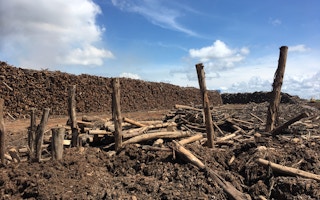One of the world’s biggest pulp mills that alarmed environmentalists when it went into production in Indonesia in 2017 plans to triple in size.
To continue reading, subscribe to Eco‑Business.
There's something for everyone. We offer a range of subscription plans.
- Access our stories and receive our Insights Weekly newsletter with the free EB Member plan.
- Unlock unlimited access to our content and archive with EB Circle.
- Publish your content with EB Premium.
An environmental impact assessment for an extension to Ogan Komering Ilir (OKI) mill in South Sumatra, seen by Eco-Business, reveals that its capacity could increase to 7 million tonnes per year, up from 2.8 million tonnes a year currently.
This will mean that the mill, owned by one of the world’s largest paper companies Asia Pulp & Paper (APP), will need an estimated 30.1 million tonnes of wood a year to reach capacity, up from 10 million tonnes a year now.
The super-charged OKI mill will consume as much wood as all of APP’s three Indonesian mills combined.
Campaign group Indonesian Forum for Living Environment (WALHI) warned that the mill extension would have “grave consequences” for Indonesian forests, lead to chronic transboundary air pollution from burning peatlands, and add to the many land disputes that APP is already involved in.
WALHI echoed previous concerns over where APP will source the fibre it will need for the mill to reach capacity, and the company’s questionable track record of keeping sustainability pledges.
APP said that it stands by its Forest Conservation Policy (FCP), a pledge made in 2013 to stop clearing natural forests, and will use only “sustainably-sourced” fibre sourced from existing production areas to feed the mill.
It added that it has a strict processes in place for evaluating suppliers, and would be reviewing their performance and sustainability commitments.
The OKI expansion plan is one of the first major projects to be greenlit since the introduction of the Omnibus Law, also known as the Job Creation Act, a controversial bill passed to generate domestic and foreign investment that is underpinned by environmental deregulation.
APP said the plan is “in compliance with the government’s policy to increase environmentally-based investment” and that it will boost employment and business opportunities.
A timeline for the development is unclear. APP said the proposed expansion will be done in phases “over the years”, and will depend on demand and the availability of wood supply.
Fire risk
WAHLI South Sumatra executive director Hairul Sobri said that while an enlarged OKI mill poses a medium-term threat to forests, a more immediate risk is fire and “haze” air pollution. Most of the land used to supply OKI mill lies on peat, a carbon-rich soil that is prone to fire when drained to plant crops to supply the paper industry.
OKI and its suppliers have been linked to peatland fires since the mill went into operation. In 2019, which had some of the worst haze levels in years, almost 65,000 ha of land used to supply OKI mill went up in smoke, more than four times the next most affected mill in Indonesia, according to data from Trase.
In 2016, OKI’s biggest supplier, PT Bumi Mekar Hijau, was fined US$6 million for its links to fire, while OKI suppliers are among those still under investigation by Singapore’s National Environment Agency for connections to the haze outbreak in 2015, which was estimated to have killed 100,000 people prematurely from air pollution in Singapore, Malaysia and Indonesia.
APP said that fire “severely impacts” its own operations, and has invested in measures to suppress and prevent blazes such as water bombing helicopters and fire towers, and works with community groups to educate the public on the dangers of slash-and-burn methods to clear the land.
Sobri said that in greenlighting the OKI mill expansion, the Indonesian government is overlooking the “ecocide” that key pulpwood industry players such as APP have been linked to in recent years.
Aidil Fitri, executive director of Hutan Kita Institute, said APP has failed to prevent its concessions from succumbing to fires and social conflicts, and the enlarged mill “will create more harm for forests and people”, not just in South Sumatra, but in Kalimantan and Papua, likely source fibre locations.
In December, a report by Environmental Paper Network (EPN) claimed that APP had flouted its own sustainability commitments, with deforestation, forest and peat fires, and social conflicts found in its areas of operation. The report also alleged that APP had not fulfilled promises to rehabilitate degraded peatlands.
APP called the report “misinformed” and based on old allegations that were untrue. EPN called APP’s response “an inaccurate and misleading response to the evidence of a failure to implement its own Forest Conservation Policy.”
News of the expansion plan emerges as a company with family ties to APP, global paper firm Paper Excellence, looks set to acquire Domtar, a North American paper company. A collective of 68 green groups have written an open letter to Domtar shareholders urging them not to go ahead with the “reputationally unsound” deal.








